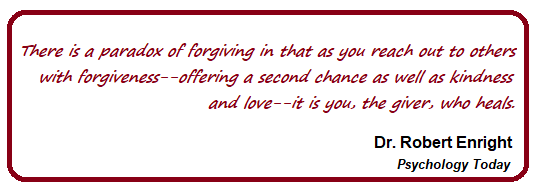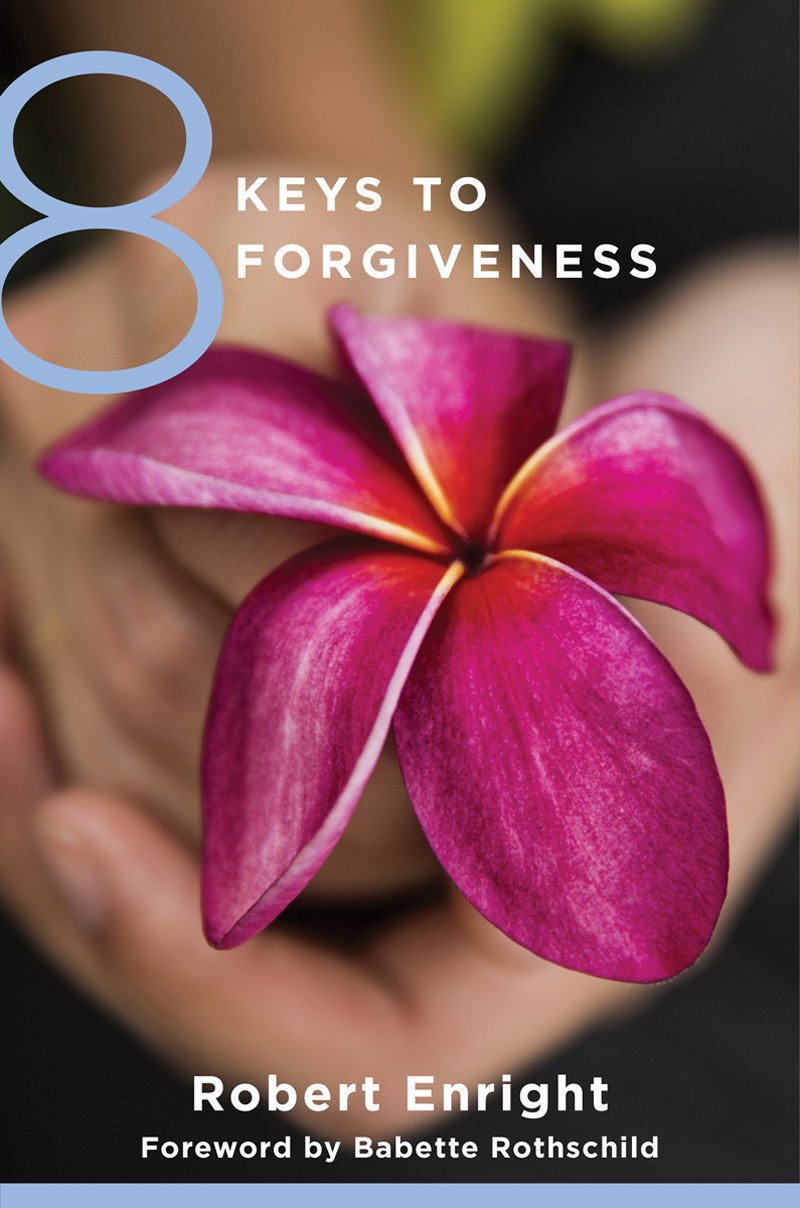Misconceptions
Why You Cannot Always Trust the Scientific Data on Forgiveness
When I teach a graduate seminar on the psychology of forgiveness at the University of Wisconsin-Madison, we as a class frequently read scientific studies with the word “forgiveness” in the title and then we commence critiquing the science that is reported. Too often, we find that what is supposed to pass for forgiveness actually is quite suspect and the conclusions should not be taken at face value. For example, when we forgive, we do so toward persons, not situations. To forgive is to willingly decide to be good to those who have not been good to the forgiver. The one who forgives has been treated unjustly by a person or persons and tries to reduce negative thoughts, feelings, and behaviors and increase positive thoughts, feelings, and behaviors toward the offending person. Forgiveness does not mean to excuse, to necessarily forget, to necessarily reconcile, or to abandon justice. So, if a scientist, as an example, has a scale of “forgiveness” that asks the participants if they forgive situations (not persons, but situations), then this researcher is not studying forgiveness at all in this context, regardless of how many times the word is used.

Image by Pexels.com
In this essay, I want to critique one study (out of four in the article mentioned below) which appeared in this published paper:
Luchies, Laura B. and Eli J. Finkel, James K. McNulty and Madoka Kumashiro, “The Doormat Effect: When Forgiveness Erodes Self-Respect and Self-Concept Clarity,” Journal of Personality and Social Psychology (2010), vol.98, no. 5, 734-749.
In their first study of the paper, they presented a “forgiveness” scale to newly married couples. The researchers continued to assess the couples in forgiveness, self-respect, and the degree to which each member of the couple showed “agreeableness” toward one another. The assessments lasted for five years and the conclusions by the authors are as follows:
“For participants who tend to forgive their spouse, the trajectory of self-respect over time depended on the spouse’s level of agreeableness…….The doormat effect subhypothesis was fully supported in that, for high forgiveness individuals whose spouse was low in agreeableness, greater forgiveness predicted significantly diminished self-respect over time.”
In other words, beware of forgiving unless the one you are forgiving has an agreeableness with you. Otherwise, you tend to devalue yourself and so forgiveness is dangerous.
Here is a critique of that study, that should give the reader of it pause in accepting the conclusions:
The forgiveness scale had nothing to do with actually forgiving the spouse because there were five vignettes that were made up. These were hypothetical situations that did not necessarily occur within the marriage, such as “failing to mail some important papers for the self, making a mess of the house.” There are two problems here: 1) The researchers were not assessing actual offenses and so there was no true construct of forgiveness toward the spouse being measured and 2) there were only five made-up stories and as you can see in the two examples above, they hardly constituted major violation of ethics for the most part.
The most serious problem in this study is the fact that the researchers never discerned what each participant meant by the word “forgiveness.” Some of the participants probably, when asked, would have said that to forgive is to “just let the incident go.” Others might have said that to forgive is to see the justification for what happened, so it really was not an injustice at all because of an extenuating circumstance. We, as the readers, just have no idea what each person means by the word “forgiveness,” so we cannot be sure if each participant was answering the questionnaire correctly. Even if many were answering it correctly, we still need to remember that these are made-up scenarios, and people may respond very differently to the hypothetical than to the real injustices against them.
Is there a “doormat” effect to forgiveness? If there is, it has yet to be accurately demonstrated. We should not give forgiveness a bad name by ambiguous science.
![]()
The Two A’s of Forgiving: Awareness Before Action
What precisely are you doing and not doing when you begin to forgive someone for something this person has done to you? I think the most basic problem is this: defining forgiveness before we actually practice it.

Image by Pexels.com
Some would argue that you are acting weakly because only the weak are able to forgive; the strong always win out, much likeNietzsche proclaimed in the late 19th century. Some would argue that returning to an unhealthy situation exposes you to abuse, but this confuses reconciliation and forgiveness. Even if you are disregarding the person who treated you unfairly, some would argue that you are moving on by “forgiving.” Not one of these truly conveys what forgiveness actually is.
Goodness toward those who have treated us unfairly is what forgiveness is. This goodness can take the form of giving up resentment, showing mercy and compassion, and even showing agape love (though this love may take some time to develop and small steps toward it may be necessary). See the reference below for more information on agape love. Most of the time, when people argue about forgiveness, the main point of contention is usually its definition. If the definition is incomplete or wrong, then the process of going about forgiving someone who offended may be distorted. Awareness before action is the key to beginning forgiveness well.
Enright, R.D., Wang Xu, J., Rapp, H., Evans, M., & Song, J. (2022). The philosophy and social science of agape love. Journal of Theoretical and Philosophical Psychology, 42(4), 220–237. https://doi.org/10.1037/teo0000202
![]()
What Are the Implications for Forgiveness if We Take the Materialist Perspective that Free Will Does Not Exist?
Nine years ago, I was asked this same question. It is starting to arise again as people consider the materialist philosophy that circumstances and issues other than free will choices determine how people behave. I introduce my answer from 2014 here and add to it. The conclusion remains: Free will is necessary if we are to understand right and wrong and even if we are to understand forgiveness.

(Image by Pexels.com)
We are all connected and so one person’s actions are not necessarily independent from others’ actions. Is this true? Some Eastern philosophies say this. Some Western psychologies say this, too. For example, family systems theory surmises that a misbehaving child likely is being influenced by pressures within the family generated by others’ behavior both inside and outside that family. Psychodynamic theories in psychology say that an adult’s actions can have causes going back to how this person was treated as a child.
Given all of the interrelated ideas above about our being interrelated in our actions, we can then make at least two moves in explaining people’s behavior: 1) no one can truly help certain actions because of others’ influences over us or 2) we all have free will and choose to act rightly or wrongly even if others’ make it hard to be good.
If we take the first turn on our journey of understanding persons, then we weaken such ideas as “right and wrong,” “justice,” and “forgiveness.” After all, how can we say that one person acted wrongly? if we are all so interconnected, then this person is not acting with any kind of genuine volition. In a certain way, his misbehavior can implicate his father, who can implicate his mother, who can implicate……..On it goes until we all share the blame which weakens the case against the original person and his actions under consideration.
If we take the second turn on our journey of understanding persons, then we strengthen such ideas as “right and wrong,” “justice,” and “forgiveness.” After all, the person, even though pressed in on all sides by others, has choices. One need not, for example, hit another person because of frustration. One’s mother has not so abused this person that she was left with one and only one option. Yes, the mother’s misbehavior (whatever it was) may make it difficult for the daughter to control her temper, but control it to a degree she can.
Free will. Independent choices. Break the laws of morality (you will not take the life of an innocent person, for example), and you do wrong. If the wrong is done to me, I can forgive. If the other does not have free will, then an apparent wrong is just that—-apparent. Do I then forgive a person for a wrong? The conclusion is no longer clear. We will have to redefine forgiveness in this case to retain the use of the word “forgiveness.” Forgiveness becomes a kind of acceptance of all along with their actions, no matter how wrong they might appear to be. We still retain such words as “compassion” and “understanding,” but the word forgiveness itself begins to fade.
If the world ever loses the word forgiveness and its true meaning, we are in very big trouble. Inner unrest and conflict within families and communities may know no end. To retain this vital concept, we must retain the truth of free will for each person.
![]()
The Backlash Against Forgiveness Continues
In a recent blog at Psychology Today, I examined “14 Popular Criticisms of Forgiveness.”
The gist of that essay is this: Many people generate their own opinions about why forgiveness is inappropriate, dangerous, disrespectful, and/or confusing, but their defense of these assertions is always, and without exception, philosophically flawed, rendering the opinion unfounded.
Well, I came across yet another set of criticisms against forgiveness and I would like to address them here. As I often do, I will not identify the author(s) because the point is to examine ideas, not persons. So then, let us begin.
1. Encouraging forgiveness might short-circuit the anger process. In other words, people tend to need a time of anger, which shows self-respect. So, don’t encourage. This, of course, is not a critique of forgiving itself. Instead, it is a criticism of those who might put pressure on others who need a time of self-reflection to work out the anger first. Our Process Model of forgiveness, since its creation over three decades ago, always has called for a period of anger and self-reflection as needed by the forgiver. Thus, forgiveness itself and even the encouragement of others to forgive are not the problems. In the case of encouragement, this depends on how the well-meaning person goes about trying to encourage another person to forgive. Is it with gentleness and understanding or is it with at least a pinch of force (which should not happen)?
goes about trying to encourage another person to forgive. Is it with gentleness and understanding or is it with at least a pinch of force (which should not happen)?
2. If you encourage people to forgive, then this might short-circuit the quest for justice. As with point 1 above, this criticism is not about forgiveness at all, but about the philosophical mistake of thinking in an “either-or” way about justice and forgiveness. It is not the case that one must choose between these two moral virtues. The criticism against forgiveness itself fails to take this into account.
3. An abuser who asks for forgiveness might be manipulating the victim into the status quo of more abuse against this victim. Again, the issue is not with forgiveness itself, but instead is a problem centered in the poor intentions of the one who asks. The one who might forgive certainly should scrutinize the motives of the one asking for forgiveness. This is plain common sense. In other words, again we have the situation in which forgiveness might be taking the blame for those who fail to ascertain motives in those who behave badly.
4. Suggesting forgiveness by groups that have been oppressed is abusive because this might perpetuate the abuse. Once again, we have a philosophical error in assuming that groups must choose between forgiving and seeking justice: Forgive and then say goodbye to the hope of a fair solution. This is reductionistic thinking. Let us help people to see that as groups consider forgiving, they should scrutinize the best way forward for a just solution to seemingly intractable social problems.
The backlash against forgiveness, I hope you see, is not about the moral virtue of forgiveness at all. Instead, it is about how people erroneously go about suggesting forgiveness or how people go about practicing forgiving. If the advice were centered on persons and how they go about the advice or how they go about the practice of forgiving, then all is well. When the criticism turns instead to forgiveness, it is time, as I have tried to do in this essay, to show the philosophical flaws in the reasoning of those who oppose the moral virtue of forgiveness.
![]()
How might people distort the process of forgiveness?
For decades, our group has been monitoring and trying to correct false definitions of what it means to forgive those who acted unjustly. For example, in defining what forgiving is, some authors have erroneously equated forgiveness with excusing the wrong done, automatically reconciling, and abandoning a quest for justice.
I have come to realize that even the process of forgiveness (how people go about forgiving) can be prone to misinterpretations, to errors in what actually occurs when a person engages in the process of forgiving. To correct these errors, let us consider four responses to these misconceptions.
- As a person walks the path of forgiveness, there is a tendency to say, “I have not done enough; I have not reached perfect forgiveness.” This kind of thinking expects too much of the forgiveness process. As Lewis Smedes said in his book, Forgive and Forget, forgiveness is for imperfect people. We rarely reach a perfect state of forgiving. We must be careful not to disparage ourselves if we still have some work to do on the forgiveness process once we exert time and effort on it. Often in our research, when people are gravely hurt by others and are very low in forgiving, they tend to go to the middle part of our forgiveness scale, not to the higher end. Yet, this progression makes all the difference as people shed excessive anger, anxiety, and depression, and can increase in self-esteem. The message here is this: Try to be temperate. On the one hand, do not expect perfect forgiveness. On the other, do not give it a half-hearted effort, concluding that, since you are not perfect, there is no need to keep trying. Strike the balance between too little effort and too high an expectation for you as a forgiver. You will know you are making progress as your anger lessens and as you wish the offending person well (as Smedes reminded us in his book).
- Here is another worry about the forgiveness process: “My process of forgiveness may create an expectation in the other that he now deserves to be back in my life.” Your engaging in the process of forgiveness may lead to a variety of different reactions in other people. Some may now demand reconciliation. This is not your fault. It is a misunderstanding on the part of the one who acted badly. Other people’s misinterpretation of your forgiving, of your goals in doing so, is not your error. It is the other’s error and so please do not hold yourself responsible (or the process of

Learn more about the process of forgiveness in this easy-to-use, step-by-step, how-to-forgive guide.
forgiveness responsible) for the other’s misinterpretation. You may have to clarify that your forgiving does not necessarily mean that you are ready to reconcile. The forgiveness process, as goodness toward others, remains good even if others misunderstand.
- Here is another: “My process of forgiveness may be so time consuming as to imbalance my full life.” This is another issue of intemperance. We can over-do (or under-do) just about anything. Be careful not to place forgiving so high on the priority list that you spend far too little time with loved ones, or neglect your job, or fail to get adequate exercise or rest. The process of forgiveness is part of a complete life.
- And here is our fourth worry about the forgiveness process: “Even as I engage in the process of forgiveness, I may not end all anger.” This kind of fear is common. People want to be done with anger and discontent which are effects of the unjust treatment against them. Even if all anger does not subside, in all likelihood, as you practice forgiving, and then try again…..and then again…..the anger lessens. You, then, are in control of the anger rather than the anger controlling you.
The definition of forgiveness can be distorted. Understanding the process of forgiving can be distorted. Do not let these distortions deter you from the life-giving practice of forgiving.



